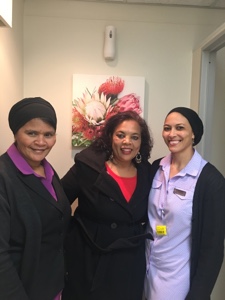Intolerance towards the disabled rears its head at The Book Lounge
 |
| Ernest looking happy and relaxed after the event and he had no clue what had transpired earlier. |
Our country still has to travel a long road in terms of accommodating our people who have disabilities. I became aware of this yesterday when a group of us - a few of the school principals and I - attended Jonathan Jansen and Molly Blank's launch of their book, How to fix South African Schools, at the Book Lounge in Roeland Street, Cape Town. The place was packed to capacity, even the basement was overflowing with folk who wanted to hear the pair speak.
I spotted two of my colleagues, Bevil Velensky, the head of Kommetjie, and Nelson Mafrika, the head of Masiphumelele High school right at the back of the bookstore. They indicated that there was a vacant spot close to them and waved at me, urging me to join them. Now, being able-bodied, I wormed my way through the crowd, apologizing profusely and made sure that my arms and handbag did not become missiles in the process. Another guest ahead of me, saw the opportunity to join the 'squeeze walk' and remarked that he was benefitting from the exercise and from securing a more comfortable standing place at the back.
Then I received a phone call from Ernest, another school head. He wanted to inform me that he was going to turn back because the place was too full. I was asked to forward his apologies to Jonathan Jansen. You see, Jonathan is an alumnus of Sullivan Primary school where Ernest Moore is the principal. They have an amazing relationship which has deepened over the years because of Jonathan's active partnership with the school.
Intolerance has a face
Like all good friends, Ernest was there to support his friend and as a school head at a poor community school, he wanted to purchase the book. Knowing Ernest, he wanted to read about strategies that successful schools are using to become excellent. This is what school heads want to know and implement at their schools. This is what the schools in the poor communities need - real, context-based richness coming from peers in our country.
Now, what to do. I appealed to Ernest to wait and indicated I would speak to the Book Lounge assistants and see what we could do. I was standing right there at the till point counter and approached the shop assistants. I addressed the one who looked rather impatient, waiting for me to speak. I briefly explained that one of the guests, a school principal with a physical disability, was unable to come into the crowded shop. Was there anything we could do to create space for him?
I was completely taken aback by the shop assistant's attitude and response. In short, I was supposed to tell Ernest he must come in and then ask people to 'give up' their seat for him. There was no way she was going to ask the able-bodied folk to do this because they had been there for a while. No smiles, almost a stare down was in process.
I stood there, trying to keep my expression as neutral as I could. I looked at the other shop assistants and glanced at my colleagues to see if I was perhaps reading too much into this exchange. No, I wasn't off the mark; there was genuinely a display of insensitivity and ignorance.
"In my experience, disabled people do not make such demands. In my experience, I repeated, disabled people will never adopt such an approach because they are sensitive to others.They never use their disability to coerce people."
The lady standing next me, nodded in agreement and the other shop assistant looked embarrassed.
The shop assistant attending to me was unmoved. "Or," she said, " you could go and ask people to get up for your friend. They may listen to you." I thanked her for this advice and marvelled at my composure.
My phone rang again. It was Ernest who wanted to give me an update. He and his wife, Jenny, would go and have a coffee somewhere in town and then they would return about 7.00pm to the Book Lounge to join us. I wanted to share this with the hostile shop attendant to underscore a characteristic trait displayed by our disabled compatriots. This is how our differently abled folk navigate their way through life. They are always willing to compromise and find creative ways, albeit inconvenient at times, to participate fully in all activities.
This short sideshow was a far more profound lesson for me last night. While I listened to the conversation facilitated by host, John Matham, peppered with criticisms against the system which hold our education system to ransom, I felt a bit sad. Here in the very corner where books are promoted, where reading and learning are actively campaigned, we had a display of intolerance that spoke volumes.
We definitely have a long, long road ahead of us. Our fixation with the flaws of public figures masks our own biases and intolerance when we engage with ordinary folk. We should start reflecting on our own behaviours and actively work towards becoming more inclusive, more human. As a start, we must start practicing Ubuntu in our homes and at our work spaces. This is common sense and it is such application of common sense that will help us transform our communities.
 |
| Ernest talking to Jonathan Jansen after returning to purchase his copy of the book, How to fix our schools I'm South Africa. Jenny, Ernest's wife, looks on. |


Comments
Post a Comment